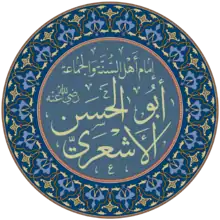Ahmad al-Ghumari
Ahmad bin Muhammad bin al-Siddiq al-Ghumari was a Muslim traditionist and scholar of Hadith from Morocco.[4]
Ahmad bin al-Siddiq al-Ghumari | |
|---|---|
| Personal | |
| Born | Friday, 26 December 1902[1] |
| Died | 1961 |
| Religion | Islam |
| Nationality | Moroccan |
| Ethnicity | Ghomara |
| Denomination | Sunni |
| Jurisprudence | Shafi'i[2][3] |
| Creed | Ash'ari |
| Movement | Sufism |
Life
Ghumari was born on 26 December 1902 (27 Ramadan 1320 AH).[1] He was the older brother of Abdullah al-Ghumari and Abd al-Aziz al-Ghumari. As a child, he studied in Morocco's traditional madrasa system, memorizing the entire Qur'an, in addition to the traditional Islamic texts Alfiya, Ajārūmīya and Bulugh al-Maram.
In 1921, he traveled to Egypt and enrolled in Al-Azhar University, returning to Morocco upon the death of his father. Ghumari went to Egypt a second time in 1931 when his younger brothers Abdullah and Muhammad also enrolled in the university. Due to fears regarding activity of the Muslim Brotherhood in Egypt, his brother Abdullah was sentenced to ten years in prison on accusations of ties to the group in 1961. Ahmad al-Ghumari, upon hearing the news of his younger brother's long sentence, fell ill and died eight months later.
Career
Ghumari authored more than one hundred books. He was well known for a debate which acrimoniously began between him and fellow hadith scholar Muhammad Nasiruddin al-Albani, and later continued with Ghumari's younger brother Abdullah and Albani.[5] Despite the older Ghumari's attestation to Albani's high level of knowledge and respected status in Hadith studies, the nature of the debate between them became personal and involved character attacks.
Like the rest of his family, Ghumari was a leader of the Siddiqiyya Sufi order,[6] a branch of the larger Shadhili order. Muhammad Taqi-ud-Din al-Hilali claimed that al-Ghumari had chosen to live a very simple life and eschewed material excess.[7]
Views
Although a practitioner of Sufism, Ghumari criticized some Sufis, especially the rival Naqshbandi order.[8] Like Ibn Hazm, Ghumari viewed scholarly differences of opinion as wrong and he often used harsh language when responding to intellectual opponents.[5][8] Having originally followed the Maliki school of thought like most of Muslim scholarship in Morocco, al-Ghumari later switched to the Shafi'i school for a period and finally opted for absolute independent reasoning.[9] Unlike most of Moroccan scholarship, al-Ghumari opposed the Ash'ari school of theology.[10] Muhammad Abu Khubza, among other Moroccan scholars, also claim that al-Ghumari temporarily adhered to the Zaidiyyah school of Shia Islam.[10]
Works
- Tabyin al-balah mimman ankara wujud hadith Wa-man lagha fa-la jumu'ah lahu. Dar al-Basa`ir, 1982.[11]
Citations
- Islamic Finder date conversion for 27 Ramadan 1320
- Oleg Grabar (1990). Muqarnas: An Annual on Islamic Art and Architecture. Brill Publishers. p. 21. ISBN 9789004093478.
- "A Short Biography of Ahmad b. al-Siddiq al-Ghumari". elwahabiya.com.
- Mustafa Shah, The Hạdīth: Scholarship, perspectives, and criticism, Routledge, 2010, p. 210
- Muhammad Moin, "Ahmed Al-Ghumari on Al-Albani". Al-Sunnah: 8 March 2011.
- Abd al-Aziz al-Ghumari, Ma Yajuz wa ma la Yajuz fi al-Hayat al-Zawjiyyah, pg. 9. Amman: Dar al-Fath, 2009. ISBN 9789957231309
- Hassan Kettani, Fiqh al-Hafizh Ahmad bin al-Siddiq al-Ghumari, pg. 58. Amman: Dar al-Bayariq, 2001. Jordanian National Library #2001/6/1146
- Gibril Haddad, The Ghumari School. 6 December 2002: Living Islam. Last updated 2 June 2003.
- Hassan Kettani, Fiqh al-Hafizh, pgs. 61-62.
- Hassan Kettani, Fiqh al-Hafizh, pg. 62.
- Tabyin al-balah at Amazon.co.uk
External links
- Avoid Imitating the Kuffar by Ahmad bin al-Siddiq al-Ghumari
- Arabic Online Biography of the Ibn al-Siddiq family
